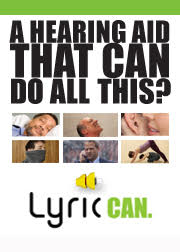Archives
Loud and Clear
Hear that? It’s the sound of a technological revolution for the hearing impaired. Bluetooth® wireless technology turns hearing aids into headsets for phones, MP3 players and more. By Karen D. Schwartz There was a time, not too long ago, when hearing-impaired individuals who use hearing aids had to wait to reach a landline before they could make or accept business calls. Cell phones tended to create so much audio feedback in the hearing aids that it could be difficult to hear conversations. “Conventional hearing aids and cell phones used together is problematic, because there is a lot of static, usually from radio interference, which causes a lot of static sound in hearing aids,” explains Crilles Bak Rasmussen, a research and development engineer for Copenhagen, Denmark–based Oticon A/S. “Those…
A workout the ears don’t need
During her first workout at Orangetheory Fitness in Fairfax, Va., Donna Reid was blown away by two things: “how hard it was and how loud it was.” The 51-year-old adored the studio’s interval training program — a mix of treadmill, rowing machine and resistance exercises — but when it came to the accompanying music assaulting her eardrums, well, that didn’t seem so sound. “I want to do something good for my body. I don’t want to do something detrimental at the same time,” says Reid, who asked the trainer to turn down the volume. She got her wish for a few minutes. But when it soon crept up again, Reid knew she’d need a different tactic. She’s settled on earplugs, which she brings without fail…
Hearing protected by limiting audio devices to an hour a day
About five to 10 per cent of people who listen to music for more than an hour a day at a high-volume setting for years are considered at high risk of developing permanent hearing loss. (Carlos Barria/Reuters) Unplug your audio player’s headphones after an hour, the World Health Organization recommends to protect hearing. About 1.1 billion teens and young adults are at risk of hearing loss from unsafe levels blasting from devices such as smartphones, noisy nightclubs and sports events, the United Nations health agency said Friday. It is based the analysis on studies in middle- and high-income countries. In workplaces, the top level of noise exposure is 85 decibels for a maximum of eight hours per day. But noise levels at dance clubs may…
Researchers Create Software For Google Glass That Provides Captions For Hard-Of-Hearing Users
Provided by Jason Maderer, Georgia Institute of Technology A team of Georgia Institute of Technology researchers has created speech-to-text software for Google Glass that helps hard-of-hearing users with everyday conversations. A hard-of-hearing person wears Glass while a second person speaks directly into a smartphone. The speech is converted to text, sent to Glass and displayed on its heads-up display. A group in Georgia Tech’s College of Computing created the Glassware when one of its own said he was having trouble hearing and thought Glass could help him. “This system allows wearers like me to focus on the speaker’s lips and facial gestures,” said School of Interactive Computing Professor Jim Foley. “If hard-of-hearing people understand the speech, the conversation can continue immediately without waiting for the…
Love Your Heart, Test Your Hearing for World Heart Day, the Better Hearing Institute Urges
Your heart and hearing may have more in common than you realize says the Better Hearing Institute (BHI),(www.BetterHearing.org) which is raising awareness of the link between hearing loss and cardiovascular disease for World Heart Day, September 29. A growing body of research shows that a person’s hearing health and cardiovascular health frequently correspond. So BHI is encouraging people to take a free, confidential, online hearing check at www.BetterHearing.org to help determine if they need a comprehensive hearing test by a hearing healthcare professional. Studies show that a healthy cardiovascular system—a person’s heart, arteries, and veins—has a positive effect on hearing. Conversely, inadequate blood flow and trauma to the blood vessels of the inner ear can contribute to hearing loss. David R. Friedland, MD, PhD, Professor…
Tame that ringing in your ears and rock on, boomers!
Bob Dylan. The Rolling Stones. Led Zeppelin. Music helped define an entire generation of baby boomers. It expressed their fresh world view and energized them as they set the world in a new direction. But if you’re like many from this music-filled, life-embracing generation, then some of that old time rock and roll may still be ringing in your ears. Literally. Tinnitus, commonly called “ringing in the ears,” is the perception of a sound in a person’s ears or head that has no external source. Many people with tinnitus experience ringing, humming, buzzing, or chirping in their ears or head. Others even perceive singing or music. Neural hyperactivity causes the perception of sound. As it turns out, tinnitus is most often the result of noise…
Celebrate the Sounds of Summer for a Lifetime: Protect Your Hearing!
As summer time kicks into full swing, Elgin Audiology is urging children, teens, and adults of all ages to protect their hearing, reminding them that permanent noise-induced hearing loss cannot be reversed. The sounds of summer are among the most cherished and offer wonderful lifetime memories. But summer time also brings loud noises that can permanently harm our hearing. Prolonged exposure to the roar of lawn mowers, power tools, motorized recreational vehicles, target shooting, concerts, loud sporting events, and fireworks all can wreak havoc on our hearing. In fact, the single bang of a firecracker at close range can permanently damage hearing in an instant, making it forever more difficult to hear the subtler sounds of summer. While many noisy recreational activities are part of…
Noisy Toys This Holiday Season
Parents may think that noise is a problem they need not worry about until their child reaches the teenage years. Not so. Some toys are so loud that they can cause hearing damage in children. Some toy sirens and squeaky rubber toys can emit sounds of 90 dB, as loud as a lawn mower. Workers would have to wear ear protection for similarly noisy sounds on the job. The danger with noisy toys is greater than the 90-dB level implies. When held directly to the ear, as children often do, a noisy toy actually exposes the ear to as much as 120 dB of sound, the equivalent of a jet plane taking off. Noise at this level is painful and can result in permanent hearing…
Early hearing loss detection and treatment is a must
Detecting and treating hearing loss early is essential. Left untreated, prolonged hearing loss can have increasingly serious consequences in both adults and children. As adults many of us laugh off a gradual decline in our ability to hear others or the activities going on around us. We say we’re “having a senior moment” or we just turn up the television or the music. Studies show, however, that the social and physiological effects of hearing loss build up over time. We may find it increasingly difficult to follow conversations and become tired of the effort it takes to sustain a rewarding social life. Relationships with family and friends can become strained and we may lose interest in activities we once found enjoyable. Further, a lack…


